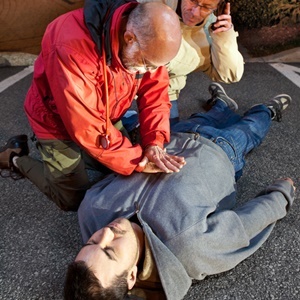
In countries like South Africa where trained medical personnel aren't always readily available, it is good to have people who are trained in CPR at hand. They can help keep a patient alive until a medical professional takes over.
A new study finds that older people have little CPR training, and they are less likely to get CPR when they suffer cardiac arrest at home.
"The new data affirms the need for targeted training in the older population," said senior study author Dr Benjamin Abella, an associate professor of emergency medicine at the University of Pennsylvania's Perelman School of Medicine.
The study was published in the Journal of the American Heart Association.
"There is a striking relationship between age and CPR training and delivery that is really important to better understand," Abella said in a university news release.
What is CPR?
Cardiopulmonary resuscitation, more commonly known as CPR, is an emergency procedure performed if someone has stopped breathing or if their heart has stopped and it is continued until the patient starts breathing again or a medical professional can take over.
The Resuscitation Council of Southern Africa is a voluntary co-ordinating body whose primary aim is to foster and co-ordinate the practice and teaching of resuscitation, and to promote uniformity and standardisation of resuscitation techniques.
Health24 distinguishes between trained and untrained people performing CPR.
Bystanders untrained in CPR: give hard and fast chest compressions, at 100 compressions per minute.
Trained professionals: give a repeated cycle of 30 chest compressions followed by two breaths.
The researchers estimate that more than 350 000 Americans suffer from cardiac arrest outside the hospital every year, and only a third receive CPR. With cardiac arrest, the heart suddenly stops beating, and speedy resuscitation is critical.
The researchers reached some of their conclusions by examining responses to telephone surveys given to more than 9 000 people in 2015.
Who receives CPR?
While almost two-thirds had received CPR training at some point, three groups – older, less educated and poorer people – had less training. Those 60 and older were half as likely to have gotten training as those under 49.
The researchers also examined statistics from a registry and found that people who suffered cardiac arrest at home were less likely to get CPR if they were older. That wasn't the case when bystanders performed CPR outside the home.
"This is a teachable moment," Abella said. "We need more aggressive, innovative and creative efforts to reach the population at risk. For example, we should consider training videos while you're waiting for a train, renewing your driving licenses, or in the waiting room before you see your doctor."
More importantly, you can make a life-and-death difference by providing chest compressions. You don't have to be perfect if you are a bystander; all you can do is provide benefit and your actions could save a life.
Read more:




 Publications
Publications
 Partners
Partners















